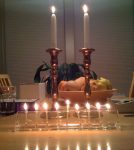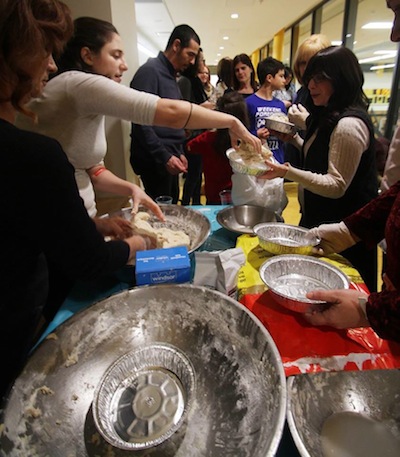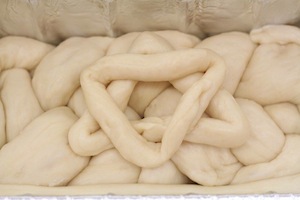(photo from flickr.com/photos/scazon)
The sky turns shades of orange and mauve as I glance outside my dining room window and notice the sun slipping behind the trees. The havoc and chatter in the house has peaked. I call my daughter to come and light the Shabbat candles with me. It’s time. Eighteen minutes before sunset.
We light the candles, nine for me, representing each of our family members, and one for her. We cover our eyes and circle the flames three times with our hands as we say the blessing that ushers in the holy Shabbat. “Baruch ata Adonai Eloheinu Melech HaOlam, asher kidshanu b’mitzvotav, v’tzeevanu l’hadlik ner shel Shabbat kodesh.” (“Blessed are you, G-d, our Master of the Universe, who has sanctified us with His mitzvah, and commanded us to light the candle of the holy Shabbat.”) Instantly, the chaos subsides and peace and serenity reign. It’s visceral, and a mystery to me how it occurs every Friday evening.
The Shabbat candles warm the atmosphere of the Shabbat table. Their soft glow draws us in. All week, we run from home to work and school, activities and errands that fill our days. Many of us do not share meals or spend time together at all!
Only on Shabbat do we have the opportunity to have precious moments with family and share meals, discuss our week’s events, share Torah thoughts and stories of the parashah, to enjoy each other’s presence as well as that of our Shabbat guests.
Shabbat, the seventh day of the week, is the gift that G-d has given us in order to reconnect with family and friends, and teach us, by His example, to rest as He did after creating our beautiful world for us in only six days. We reconnect with our G-dly souls and recharge our batteries for the busy week ahead. We pray at home and in a synagogue and get a special spiritual feeling as we connect to G-d and our community.
We also have Chanukah, an eight-day festival of lights, falling yearly on the 25th day in the winter month of Kislev. Chanukah recalls the Jews’ victory, with a small army, over the huge Greek army in the second century BCE. It also commemorates the miracle of the tiny bit of light, enough to burn for one day, which lasted for eight days, until the rededication of the Temple was possible after the struggle.
The Shabbat candles are placed inside our homes, while the Chanukah candles are placed so they can be seen from outside our homes. Why the difference?
On Shabbat, we are supposed to enjoy and benefit from the holy glow of the Shabbat candles as they shine over the beautifully set Shabbat table, with its white tablecloth and lavish settings. It is the main attraction for those fortunate to have a place around the table.
On Chanukah, we are forbidden to use the light of the menorah for any practical purpose. As the Chanukah candles melt, we are not supposed to do any housework at all. Only after they’ve melted, can we celebrate the miracle of the oil with food and games.
From this, we can extrapolate an essential difference between Shabbat and Chanukah. Shabbat is for us, the Jewish people; it nourishes and reinforces us weekly. Chanukah reaches beyond the warmth of the home to light up the darkness of the outside world. It reminds us not to be afraid, even in the harshest times. And Chanukah candles teach us to stand up and speak out for those who do not possess this strength. This feeds a pride that transcends ego. This is our proud Jewish heritage and our gift to the world.
As I polish my Shabbat candelabra, candlesticks and our family’s chanukiyah, I smile as memories of past Shabbatot and Chanukah celebrations mingle with anticipation. This year, Chanukah begins on the evening of Dec. 12 and continues until the 20th. Wishing you a very happy and festive Chanukah.
Esther Tauby is a local educator, writer and counselor.






